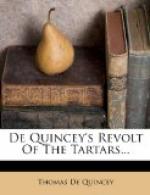was followed by a year in a private school at Winkfield,
which was terminated by an invitation to travel in
Ireland with young Lord Westport, a lad of De Quincey’s
own age, an intimacy having sprung up between them
a year earlier at Bath. It was in 1800 that the
trip was made, and the period of the visit extended
over four or five months. After this long recess
De Quincey was placed in the grammar school at Manchester,
his guardians expecting that a three years’ course
in this school would bring him a scholarship at Oxford.
However, the new environment proved wholly uncongenial,
and the sensitive boy who, in spite of his shyness
and his slender frame, possessed grit in abundance,
and who was through life more or less a law to himself,
made up his mind to run away. His flight was
significant. Early on a July morning he slipped
quietly off—in one pocket a copy of an English
poet, a volume of Euripides in the other. His
first move was toward Chester, the seventeen-year-old
runaway deeming it proper that he should report at
once to his mother, who was now living in that town.
So he trudged overland forty miles and faced his astonished
and indignant parent. At the suggestion of a
kind-hearted uncle, just home from India, Thomas was
let off easily; indeed, he was given an allowance of
a guinea a week, with permission to go on a tramp
through North Wales, a proposition which he hailed
with delight. The next three months were spent
in a rather pleasant ramble, although the weekly allowance
was scarcely sufficient to supply all the comforts
desired. The trip ended strangely. Some
sudden fancy seizing him, the boy broke off all connection
with his friends and went to London. Unknown,
unprovided for, he buried himself in the vast life
of the metropolis. He lived a precarious existence
for several months, suffering from exposure, reduced
to the verge of starvation, his whereabouts a mystery
to his friends. The cloud of this experience
hung darkly over his spirit, even in later manhood;
perceptions of a true world of strife were vivid;
impressions of these wretched months formed the material
of his most sombre dreams.
Rescued at last, providentially, De Quincey spent the next period of his life, covering the years 1803-7, in residence at Oxford. His career as a student at the university is obscure. He was a member of Worcester College, was known as a quiet, studious man, and lived an isolated if not a solitary life. With a German student, who taught him Hebrew, De Quincey seems to have had some intimacy, but his circle of acquaintance was small, and no contemporary has thrown much light on his stay. In 1807 he disappeared from Oxford, having taken the written tests for his degree, but failing to present himself for the necessary oral examination.




